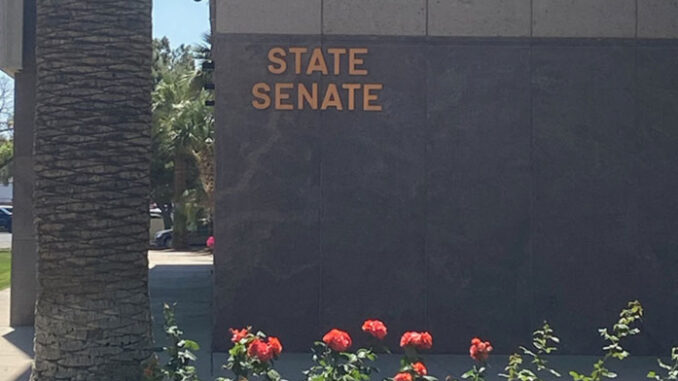
by Daniel Stefanski | Dec 1, 2023 | News
By Daniel Stefanski |
A major U.S. Border Patrol sector’s social media communication about the ongoing crisis on the ground has gone dark.
Last week, John R. Modlin, the Chief Patrol Agent of the U.S. Border Patrol’s Tucson Sector, posted to “X” that his sector’s “social media accounts will be paused until further notice in light of the ongoing migration surge.” Chief Modlin expressed his appreciation for viewers’ “understanding and continued support during this challenging time.”
The post from Chief Modlin garnered significant attention – and subsequent outrage – as individuals opined on the reasons for the stoppage of the flow of weekly information from this sector on these accounts. Chief Modlin appeared to delete his post later, adding an update, writing, “Apologies for my earlier hastily written statement. To be clear, it is my intention to remain transparent.”
Chief Modlin explained that “in light of the ongoing migration surge, all Tucson Sector Border Patrol social media accounts will be temporarily reduced to maximize our available staffing in support of our current operational challenges. At this time, all available personnel are needed to address the unprecedented flow. The social media team will return once the situation permits.”
The CBP leader did reveal that his sector would “continue to post our Week in Review statistics, demonstrating the continued efforts of our agents and staff.”
The Tucson Border Sector has long been one of the nation’s most dangerous along the U.S.-Mexico boundary due to the proliferation of deadly drugs (such as fentanyl) and ‘gotaways.’ However, in the latter half of this year, this sliver of the border has become the busiest sector in more ways, attracting tens of thousands of individuals who are apprehended by agents. Chief Modlin’s regular posts on the work Tucson agents have done to triage the happenings on the ground have been extremely instructive for outsiders and stakeholders to understand the breadth of the crisis that continues to be exploited and exponentially grow with each passing month.
In the first month of Fiscal Year 2024, October, this sector reported over 55,000 encounters of illegal immigrants, which was a 140.8% increase over the previous year’s numbers for that month (22,938). Tucson Sector Officials recorded almost 374,000 arrests during the recently completed fiscal year.
These numbers, already significantly high for a portion of the U.S.-Mexico border, do not represent the number of ‘gotaways’ escaping detection and making their way around the interior of America’s homeland. Nor do these figures fill in another major gap of the border crisis, which is the rampant drug smuggling that occurs all throughout the border – but especially in the Tucson sector. Drug cartels and smugglers occupy the time of border agents with thousands of arrests per day, while running drugs and ‘gotaways’ through other unmanned corridors. These dangerous factors of the porous border continue to haunt law enforcement at all levels as they attempt to do everything they can to protect innocent men, women, and children from harm.
The skyrocketing numbers from the Tucson sector make it all the more important for government officials and agents on the ground to be as transparent as possible about the handling of this crisis.
Daniel Stefanski is a reporter for AZ Free News. You can send him news tips using this link.

by Corinne Murdock | Nov 30, 2023 | Education, News
By Corinne Murdock |
Democratic lawmakers staged a last-minute boycott of the joint committee on free speech at Arizona’s universities.
On Monday, hours before the hearing began, House and Senate Democrats announced their boycott in a joint statement. They claimed that the Joint Legislative Ad Hoc Committee on Freedom of Expression at Arizona’s Public Universities had no purpose other than to allow lawmakers to grandstand and to sow misinformation and division.
GOP legislators formed the committee following a controversy earlier this year concerning Arizona State University (ASU) faculty members and a T.W. Lewis Center event featuring prominent conservative speakers.
The Democratic lawmakers also accused their Republican colleagues of furthering lies, and of endangering university students and faculty. Specifically, the caucuses cited an altercation last month between ASU professor David Boyles and Turning Point USA journalists.
“It was made clear that Republican elected officials continue to prop up falsehoods and possibly undermine the safety of students and faculty, as happened when an alt-right camera crew subsequently harassed and assaulted a professor who is a member of the LGBTQ community on the ASU campus,” said the caucuses. “We do not think that this committee will objectively help ASU to take the necessary steps to ensure respect for all speakers to be heard.”
One of the Barrett Honors College (Barrett) professors who opposed the conservative speakers earlier this year, Alex Young, praised the Democratic lawmakers’ boycott. Young indicated that right-leaning lawmakers and other public figures had engaged in hypocrisy by similarly opposing an event featuring Rep. Rashida Tlaib (D-MI) earlier this month.
“Good call. The far-right forces waging a disinformation campaign against Barrett faculty in the name of ‘free speech’ never had any credibility, but their cheering the cancellation of @RepRashida definitively revealed their attacks to be nothing but a politically motivated farce,” said Young. “This hearing, as ridiculous as it was, should clarify for everyone what the entire disinformation campaign being waged against Barrett faculty is all about: an attempt to restrict free speech on campus, not an effort to protect it.”
ASU issued a 75-page report summarizing its investigation into the state of free speech on its campus, namely concerning the controversy that occurred earlier this year, in compliance with the legislative committee’s directive issued at its last meeting in July.
The committee asked ASU to investigate whether Barrett faculty or administrators ran a national condemnation campaign, violated policy with actions in the classroom, censored speech or interfered with advertising or attendance, or publicly attacked T.W. Lewis Center donors. The university said it couldn’t find evidence to support the accusations.
Monday’s hearing lasted nearly three hours. The committee heard testimony from Tom Lewis, the principal donor of the now-dissolved T.W. Lewis Center, the entity behind the controversial event featuring conservative speakers that prompted the committee’s creation; as well as Lin Blake, the former events operator for ASU Gammage Theater; Brett Johnson on behalf of ASU; Jake Bennett, a policy director with the Israeli American Coalition for Action; and an ASU student identified as “Zack.”
Lewis noted that he began giving his millions to ASU years ago in the hopes of establishing a center to teach courses about success and entrepreneurship, but he reportedly discovered that faculty were reluctant to teach the content and that leaders were more interested in increasing enrollment than ensuring curriculum quality.
“I’ll say about the universities that they don’t take any responsibility for the classroom, but they are willing to sign gift agreements where they receive significant amounts of money from donors,” said Lewis.
In her testimony, Blake linked her termination from ASU with her involvement in allowing two conservative-oriented events to occur at the Gammage Theater. Blake claimed that the theater’s leadership reprimanded her for allowing those events, and that following the events her responsibilities were slowly sapped until she was fired. Blake said the fact that the controversial event still occurred didn’t mean the existence of free speech at ASU.
“If free speech was truly free at ASU, producing events with unpopular viewpoints would not have cost me my job,” said Blake.
Johnson disputed that claim entirely. Johnson also disputed the claim that Ann Atkinson, formerly the head of the T.W. Lewis Center, was let go from her position due to her arranging the controversial speaker event. Johnson indicated there was an impasse over Atkinson’s retainment on condition of her T.W. Lewis Center salary of over $300,000.
Atkinson didn’t testify at this meeting, but she did testify at the previous meeting.
In his testimony, Bennett touched on the trend of local and college student activists engaging in pro-Hamas activity. He suggested the employment of anti-terrorism statutes to defund and deactivate student organizations providing material support to Hamas, which is the designated terrorist organization that governs Gaza. Bennett also suggested the deportation of those terrorist sympathizers on student and temporary visas, as well as the enforcement of Civil Rights laws to secure college campuses.
In closing, the ASU student and self-described conservative political activist “Zack,” claimed that pro-Palestine students protesting the Israel-Hamas War were making general death threats to him and others protesting on behalf of Israel. This included threats like how Adolf Hitler “should have finished the job gassing the Jews,” and students mimicking throats being slit. Zack said that his Jewish friends reported these instances to campus police. Lawmakers encouraged Zack to bring copies of the police report(s) during their next meeting on Jan. 4, 2024.
State Rep. Austin Smith (R-LD29) said that this entire ordeal has made him lose faith in the Arizona Board of Regents’ (ABOR) ability to oversee the universities, which he called “a rubber stamp” for ASU President Michael Crow.
“Our job is not to have to govern the universities. Our job is to implement the laws that the board of regents enforces at these universities. I don’t think that they do,” said Smith. “The Democrats specifically do not want competition. You’re gonna go exactly where we tell you to go to school, and you’re gonna learn, and you’re gonna sit down and you’re gonna shut up and you’re not gonna question anything. And Michael Crow, who thinks he knows better than the Founding Fathers.”
Corinne Murdock is a reporter for AZ Free News. Follow her latest on Twitter, or email tips to corinne@azfreenews.com.

by Daniel Stefanski | Nov 30, 2023 | News
By Daniel Stefanski |
An Arizona lawmaker was recognized for her efforts on behalf of law enforcement this past legislative session.
On Tuesday, the Arizona House Republicans Conference announced that freshman State Representative Selina Bliss “was recently honored by the Arizona Constable Association for her dedicated efforts in support of Arizona constables.” Those efforts included the sponsoring of HB 2617 in 2023, which would have fixed “a disparity in current state law whereby retired constables have more extensive carry rights and protections than their active-duty counterparts.”
In a statement, Bliss said, “It is an honor to champion our law enforcement and peace officers in Arizona. HB2617 reflects our commitment to ensuring that constables, as essential members of our law enforcement community, are afforded the necessary privileges and protections to carry out their duties effectively. This bipartisan effort reflects our collective dedication to strengthening public safety and supporting those who are sworn to serve and protect on the front lines.”
The honor from the Arizona Constable Association follows one given earlier this year to Bliss from the Arizona Citizens Defense League, which named the Republican Representative from northern Arizona as its “Legislator of the Year.”
Representative Bliss wasted no time in coming to the legislature and working to achieve results for her constituents and Arizonans. Bliss introduced HB 2617, which would have “allowed a constable or deputy constable to carry a firearm, both on and off duty and in the same manner as other certified peace officers, if the constable or deputy constable is in compliance with the Arizona Peace Officer Standards and Training Board (AZPOST) firearms requirements and has fulfilled all other requirements as prescribed.” The first-term legislator told AZ Free News that she had introduced the bill after learning from her own Yavapai County Constable Ron Williams “that constables and deputy constables are not part of the list in ARS 38-1113, which covers off-duty carry of firearms by peace officers.”
Even though the legislation passed out of the State House with broad bipartisan support on May 15, Governor Katie Hobbs vetoed the bill four days later. In the governor’s veto letter to House Speaker Ben Toma, Hobbs said, “I am concerned that this bill would have expanded the authority of constables to carry a gun while off-duty whereby some constables may choose to view themselves as having a ‘duty to respond’ when they are off duty.”
Daniel Stefanski is a reporter for AZ Free News. You can send him news tips using this link.

by Corinne Murdock | Nov 29, 2023 | News
By Corinne Murdock |
Back in October, Democratic lawmakers and activists used the death of a homeless man to advocate for their progressive homelessness policies, claiming he died from the heat; in fact, he died from drug usage, some of which they may have assisted.
According to an autopsy report obtained by AZ Free News, Roosevelt White III, a 36-year-old former resident of the notorious mass homeless encampment known as “The Zone,” died in early September from complications of a left middle cerebral artery ischemic stroke. Contributory cause of death was identified as hypertensive cardiovascular disease, diabetes mellitus, and methamphetamine intoxication. White’s fatal injury occurred when he consumed methamphetamine in the setting of underlying natural disease processes.
“In consideration of the known circumstances surrounding this death, the available medical history, and the examination of the remains, it is my opinion that the cause of death is complications of a left middle cerebral artery ischemic stroke with hypertensive cardiovascular disease, diabetes mellitus, and methamphetamine intoxication as significant contributing conditions,” stated the autopsy report.
Nowhere in the autopsy report was heat or heat-related illness mentioned; nor was it mentioned as a contributing factor or cause of death.
Yet, multiple Democratic lawmakers told the public that White died from heatstroke. Though unclear where they obtained all of their information, it appears that their only source was a Democratic activist opposed to the cleanup of The Zone, rife with the type of drug use that ultimately took White’s life.
Among those who propagated the misinformation about White’s death were Reps. Nancy Gutierrez (D-LD18) and Analise Ortiz (D-LD24).
Gutierrez decried Republicans for denying the purported climate and housing crises plaguing the state, and said universal school choice was to blame as well. She then encouraged the public to stop voting for Republicans.
“It’s heartbreaking to hear of another heat-related death.The party in charge denies that we have a climate crisis, a housing crisis & they are giving our tax dollars to the rich for private schools,” said Gutierrez. “We must do better for the people of AZ. Your vote matters.”
Ortiz blamed a lack of affordable housing as well, and placed blame for White’s death on the government.
“We have lost another community member to the heat and the lack of adequate shelter space and affordable housing in Phoenix. The state is failing to meet the most basic needs of our friends and neighbors,” said Ortiz.
Stacey Champion, a public relations consultant and formerly a member of Phoenix’s Sustainability Advisory Committee and the Planned Parenthood Advocates of Arizona board of directors, shared the post as well.
At least one media outlet also took the progressive activists’ at their word that White died from heatstroke: AZ Family.
The viral post cited by the lawmakers and fellow activists came from Megan Kepler, a Democrat activist who volunteers with an organization that feeds the homeless, Feed Phoenix.
“We at Feed Phoenix are heartbroken at the news that our friend Roosevelt passed away in his tent due to heatstroke in the Zone. He was an amazing and talented human and volunteer with Feed Phoenix who was working to better his life, in spite of the odds against him. His death demonstrates the failure of our system to provide assistance to individuals who need our help. His heart was big. He should not have died in a tent. He was 36 years old. Rest in power Roosevelt. You deserved better from us.”
Although Kepler claimed White “died in a tent,” the autopsy record noted that White died in the hospital following multiple days filled with numerous attempts to save his life, including a thrombectomy and intubation. White was admitted on Sept. 9 and died on Sept. 12.
As part of Kepler’s activism, she helped pass out “safe use supplies”: clean syringes and naloxone, to assist the homeless in their usage of drugs, such as the meth that ultimately killed White. Rep. Ortiz helped with this effort at least once.
Kepler has also engaged in activism with Black Lives Matter Phoenix Metro, Poder in Action Arizona, Desert Star Family Planning, Go With the Flow Mutual Aid, Radical Women Phoenix, Progress Arizona, Shot in the Dark Phoenix, Arizona For Abortion Access, Phoenix Womxn Rising, Mutual Aid Phoenix, and Women’s March Phoenix.
About a month before his death, White told The Arizona Republic that he declined shelter services during the city’s cleanup of The Zone, instead opting to relocate within the mass encampment. Per our past reporting, many of the homeless labeled as “service resistant” will turn down shelter because they can’t bring their drugs inside.
As reported in July, a majority of heat deaths in Maricopa County involved methamphetamine.
Per the autopsy report, White’s organs were taken for donation by the Donor Network of Arizona. Drug use and/or overdose doesn’t disqualify an individual from organ donation.
Corinne Murdock is a reporter for AZ Free News. Follow her latest on Twitter, or email tips to corinne@azfreenews.com.

by Corinne Murdock | Nov 29, 2023 | News
By Corinne Murdock |
Derek Chauvin, the former Minnesota police officer imprisoned for the murder and civil rights violations of George Floyd, is expected to survive the stabbing he sustained last Friday at Tucson’s Federal Correctional Institution (FCI).
The incident was initially shrouded in mystery, with Chauvin’s identity released via an anonymous source to AP News, and his family kept in the dark.
Chauvin’s mother, Carolyn Pawlenty, was not informed of the stabbing for over 24 hours after it occurred, Alpha News reported. Pawlenty found out about the attack on her son through the media.
“How the hell do these news agencies know and his own mother doesn’t even know? And that [prison] has an emergency contact number [for me],” said Pawlenty.
Minnesota Attorney General Keith Ellison later confirmed to the media that Chauvin was the unidentified prisoner attacked.
A little over a week before the stabbing, Chauvin made his first public statement to Alpha News in their documentary, “The Fall of Minneapolis,” calling his trial and sentencing “a sham.” Chauvin said that he followed his department’s Maximal Restraint Technique policy as required of him.
One of Chauvin’s attorneys, Bill Mohrman, said at the time that the Bureau of Prisons hadn’t responded to their request for information about Chauvin’s condition, even after media reports.
Another of Chauvin’s attorneys, Gregory Erickson, told outlets on Monday that the prison refused to provide him information about his client’s condition and the attack until Chauvin signed consent papers. Erickson told reporters that both he and members of Chauvin’s family had reached out to the prison multiple times to no avail.
FCI Tucson issued a press release that Chauvin was attacked around noon and that his injuries required “life-saving” medical intervention. The prison disclosed that they had also notified the FBI of the attack.
“Responding employees initiated life-saving measures for one incarcerated individual. Emergency Medical Services (EMS) were requested while life-saving efforts continued,” said the prison. “The incarcerated individual was transported by EMS to a local hospital for further treatment and evaluation.”
FCI Tucson is a medium security prison with just under 400 inmates total, both male and female. Chauvin was transferred to the prison last August from the Minnesota state prison. Unlike in Minnesota, Chauvin wasn’t kept in solitary confinement at FCI Tucson.
Chauvin is facing two concurrent sentences: 22 years for second-degree murder, and 21 years for civil rights violations. The Supreme Court rejected Chauvin’s appeal of his murder conviction last week, just days before the attack.
Floyd’s autopsy determined that his cause of death wasn’t from Chauvin kneeling on his neck, contrary to popular belief. Rather, it was concluded that Floyd’s demise came from the conjunction of preexisting health conditions — coronary heart disease characterized by an enlarged heart and untreated hypertension, with one artery blocked about 75 percent, and inflamed lungs — as well as a drug cocktail of 19 ng/ML of methamphetamine, 11 ng/ML of fentanyl, and 5.6 ng/ML of norfentanyl in his system. The fentanyl alone was determined to be a fatal dosage.
“The autopsy revealed no physical evidence suggesting that Mr. Floyd died of asphyxiation. Mr. Floyd did not exhibit signs of petechiae, damage to his airways or thyroid, brain bleeding, bone injuries, or internal bruising,” stated the report. “That is a fatal level of fentanyl under normal circumstances.”
Corinne Murdock is a reporter for AZ Free News. Follow her latest on Twitter, or email tips to corinne@azfreenews.com.

by Daniel Stefanski | Nov 29, 2023 | Education, News
By Daniel Stefanski |
Arizona’s Education Department is attempting to engage the state’s children in a greater awareness and appreciation of American citizenship.
Earlier this month, Superintendent of Public Instruction Tom Horne revealed that the Arizona Department of Education would be conducting a “drawing, painting, and poster contest celebrating Citizenship.”
In a statement accompanying the news release, Horne said, “I am a strong proponent of the Six Pillars of Character which are, Trustworthiness, Respect, Responsibility, Fairness, Caring and Citizenship. I am very pleased to announce this contest promoting Citizenship, which emphasizes volunteering, cooperation, being informed and voting, knowing and obeying laws, choosing to protect the safety and rights of others and doing your share to make your home and community better.”
According to the Department, there will be two tiers to the contest: K-8 students “who can create a drawing, painting or poster that conveys the trait of Citizenship,” and high school students who “create a poster that supports character values on social media using the good Citizenship pillar.” The contest is open to all Arizona K-12 students in district, charter, private, and home schools, and the deadline to turn in submissions is at the end of the year, December 31.
The Department also offers a Character Education Matching Grant, which is made available to “any public or charter school that teaches a character education curriculum pursuant to section 15-719.” Programs are expected to include a minimum of six of the following ‘character’ attributes: attentiveness, caring, citizenship, compassion, diligence, discernment, fairness, forgiveness, generosity, gratefulness, initiative, integrity, obedience, orderliness, respect, responsibility, sincerity, trustworthiness, virtue, and wisdom.
The Republican schools chief is a strong advocate for Arizona’s emphasis on character education training in schools. He noted, “I believe every school in Arizona should be using the Six Pillars of Character program to help students understand these basic characteristics that, when followed, result in students having overall strong character and classrooms that have students who respect others. This is foundational for a healthy society.”
There will be a ‘Character Education Celebration Event’ in January, where the winners of this new contest will be honored.
Daniel Stefanski is a reporter for AZ Free News. You can send him news tips using this link.






